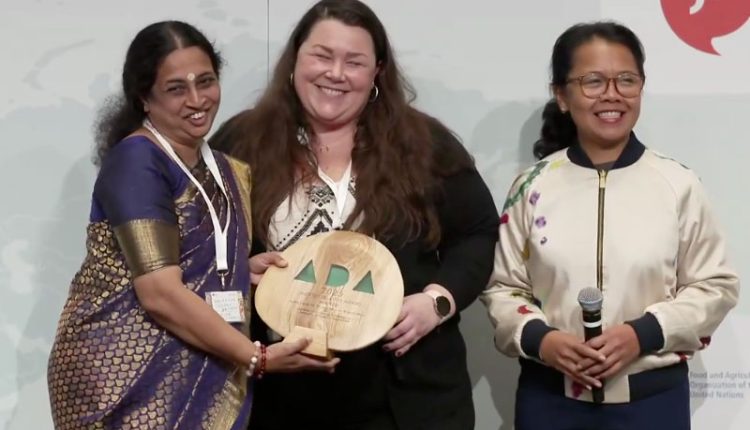Amrita Center For Wireless Networks and Applications receives Averted Disaster Award (ADA) 2023 For Exemplary Disaster Risk Management Intervention
New Delhi, 30th October 2023: The Amrita Center for Wireless Networks and Applications (AmritaWNA) has been honored with the prestigious 2023 Averted Disaster Award (ADA) for their outstanding contributions to Disaster Risk Management (DRM) during the 11th Global Dialogue Platform on Anticipatory Humanitarian Action recently held on October 12 in Berlin.
Established in December 2021, the Averted Disaster Award is an annual global competition designed to spotlight successful DRM initiatives and policies worldwide. ADA is a unique recognition that celebrates disaster mitigation interventions that are effective but may go unnoticed.
The Amrita Center for Wireless Networks and Applications was commended for their exemplary work in integrating landslide early warning technology and mobilizing communities for emergency preparedness and resilience in the Himalayas and Western Ghats regions of India. The Center deployed the world’s first AI-integrated IoT System for early warning of landslides in Munnar, Western Ghats, and Sikkim, Eastern Himalayas. Amrita’s approach bridged the gap between technology and impacted communities, as scientists collaborated closely with community members to comprehend the challenges of residing in landslide-prone areas, co-designing solutions with them.
During her acceptance speech, Dr. Maneesha Vinodini Ramesh, Director, Amrita Center for Wireless Networks & Applications (AmritaWNA), said, “We are deeply honored and humbled to receive the 2023 Averted Disaster Award for our work in disaster risk reduction. I would like to dedicate this award to our Chancellor, Sri Mata Amritanandamayi Devi whose visionary leadership has led us to this project. That’s why today we are able to have an early warning system that facilitates anticipatory actions, enabling the timely evacuation of people from landslide prone areas and saving lives. In this regard, I would like to thank the funding agencies, advisors and all the dedicated team members, who have joined and worked hard on this project. We were able to scale it to other parts of India, and today we have deployment in Sikkim. The government has also requested us to expand it to other 10 states in India, which we are actively working on. This would help us to provide dynamic, regional warning and site specific early warning by working very closely with the people.”
AmritaWNA’s pioneering efforts effectively predicted landslides and saved lives through effective communication and emergency training within vulnerable communities. This collaborative approach yielded improved technology that safeguards communities and preserves lives. Despite an increase in landslides in the region in recent years, countless lives have been preserved owing to Amrita’searly warnings and community engagement.
Prof. David Lallemant, co-founder of the ADA and an Assistant Professor at Nanyang Technological University, expressed, “The Averted Disaster Award’s objective is to bring attention to effective risk reduction interventions that often go unnoticed. India, one of the world’s most disaster-prone countries, faces a significant landslide threat in areas like Munnar and its surroundings. With the Averted Disaster Award, our aim is to illuminate impactful initiatives such as this one, facilitating their replication, adaptation, and scaling in communities that require them.”
Dr. Shanna McClain, Disasters Program Manager at NASA, ADA Selection Committee Member, and host of the award ceremony, said, “Amrita’s collaborative approach bringing together scientists and the community is an example of best practice in developing effective disaster risk technology. When at-risk communities are engaged as implementing partners from the outset, they are more likely to follow emergency guidance and develop long-term community resilience.”
While catastrophic events are emphasized, often triumphs of structures that withstand earthquakes, thanks to resilient building codes, are overlooked, the prevention of wildfires through effective forest management, or the early-warning systems that save lives during typhoons. In the realm of DRM, success often translates to ‘nothing happens’, leading to a potential undervaluing of proactive intervention. The Averted Disaster Award aims to illuminate these successes and highlight ‘what might have been’, applauding the exceptional efforts of those dedicated to safeguarding our communities and the world.

